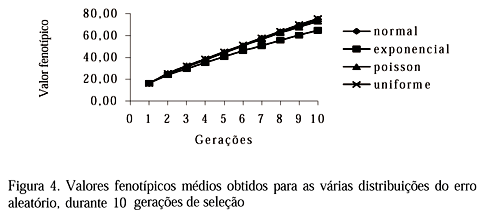Simulation studies were conducted to evaluate the effects of two assumption violations of the methodology of mixed models (the variances are known without errors and normal distribution of the random errors) on the genetic gains. Phenotypic values and accuracy during 10 generations of selection were also studied. Initially, a genome of only one quantitative trait governed by 500 loci was simulated. The genome was used to construct the base population in which the initial heritability of the quantitative trait was 0.10. To obtain a relationship structure from the base population, a initial population was generated. To this population a selection process and the errors in the components of variance and the distribution of the environment effects were introduced. To violate the assumption that the genetic variance is known without errors, the following errors intensities 0%, -10%, -30%, -50%, 10%, 30% and 50% were tested, and to violate the assumption that the distribution of the random errors is normal, the following distribution were considered: normal, exponential, poisson and uniform. In each generation 20 males and 100 females were selected and they were mated in the ratio of one male to five females and five offspring per each mating. To minimize random drift this process was reapeted 30 times. There was no evidence of the effect of both assumption violations on the genetic gain, the phenotypic value and accuracy over 10 generations of selection.
BLUP; mixed model methodology; assumptions; additive genetic variance; ramdon error distribution






